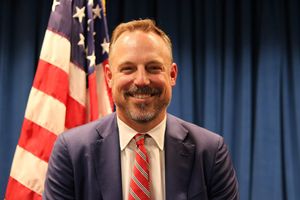March 22 2010 12:00 AM EST
Treatment GuideJust DiagnosedSex & DatingAfrican AmericanStigmaAsk the HIV DocPrEP En EspañolNewsVoicesPrint IssueVideoOut 100
CONTACTCAREER OPPORTUNITIESADVERTISE WITH USPRIVACY POLICYPRIVACY PREFERENCESTERMS OF USELEGAL NOTICE
© 2026 Pride Publishing Inc.
All Rights reserved
All Rights reserved
By continuing to use our site, you agree to our Privacy Policy and Terms of Use.
Changing the words used to describe someone struggling with alcoholism or drug addiction may significantly alter the attitudes of health care professionals, even those who specialize in addiction treatment. Massachusetts General Hospital researchers have found that health professionals' answers to survey questions about a hypothetical patient varied depending on whether he was described as a "substance abuser" or as "having a substance use disorder." Their study will appear in the International Journal of Drug Policy and has been released online.
"We found that referring to someone with the 'abuser' terminology evokes more punitive attitudes than does describing that person's situation in exactly the same words except for using 'disorder' terminology," says John F. Kelly, PhD, associate director of the MGH Center for Addiction Medicine, who led the study. "Reducing the use of such stigmatizing terms could help diminish the shame, guilt and embarrassment that act as barriers, keeping people from seeking help."
The authors note that misuse of alcohol and other drugs is the leading public health problem in the U.S. and that, while treatment can be very successful, it is sought by only 10% of affected individuals. The stigma against addiction problems is often cited as a major reason for not seeking treatment. Even though the World Health Organization acknowledged "abuser" as a stigmatizing term 30 years ago, it remains in common usage. The current study was designed to determine whether calling someone "a substance abuser" versus "having a substance use disorder" led to different judgments about the individual's ability to regulate behavior, the need for treatment versus punishment and whether that person could be a social threat.
The investigators randomly distributed surveys to more than 700 mental health professionals attending two 2008 conferences focused on mental health and addiction. The surveys began with a paragraph describing the current situation of "Mr. Williams," who is having trouble adhering to a court-ordered treatment program requiring abstinence from alcohol and other drugs. On half of the surveys, he is referred to as a "substance abuser;" on the others, he is described as having "a substance use disorder," with the rest of the narrative being exactly the same. The survey consisted of 32 statements about Mr. Williams' situation, and participants were asked to indicate how much they agreed or disagreed with those statements.
More than 500 completed surveys were returned, and one third of the responding participants indicated they had a professional focus on addiction. While the way "Mr. Williams" was described did not significantly change whether respondents regarded him as a threat or thought he should be referred for treatment, participants who received the paragraph describing him as a "substance abuser" were significantly more likely to agree that he should be punished for not following his required treatment plan. They were also more likely to agree with statements implying that that he was more to blame for his difficulty adhering to the court requirements.
"Our results imply that these punitive attitudes may be evoked by use of the 'abuser' term, whether individuals are conscious of it or not, and suggest that this term perpetuates that kind of thinking," Kelly explains. "From the perspective of the individual sufferers, who often feel intense self-loathing and self-blame, such terminology may add to the feelings that prevent them from seeking help."
Kelly notes that terms like "abuser" are not used in other clinical areas -- individuals with eating-related problems are almost universally referred to as having an "eating disorder" and not as "food abusers." While national and international health agencies have advocated eliminating "substance abuser," the term remains in common use, even in literature from federal agencies.
"There's an old proverb that states, if you want something to survive and flourish, call it a flower; if you want to kill it, call it a weed," he adds. "Saying that someone has a substance use disorder conveys the notion that they are suffering from something that may be treatable, which of course is true. Anything we can do to eradicate or minimize stigma-related obstacles to treatment will help reduce the prodigious social impact these disorders have on individuals and society, and changing the way we refer to affected individuals is one simple and achievable step towards that goal."
Kelly is an associate professor in the Harvard Medical School Department of Psychiatry. Cassandra Westerhoff of the MGH Center for Addiction Medicine is co-author of the International Journal of Drug Policy study, which was funded by an MGH institutional grant.
From our Sponsors
Most Popular
“So much life to live”: Eric Nieves on thriving with HIV
September 03 2025 11:37 AM
Messenger RNA could be the key to an HIV vaccine — but government cuts pose a threat
August 20 2025 8:02 AM
It’s National PrEP Day! Learn the latest about HIV prevention
October 10 2025 9:00 AM
Amazing People of 2025: Javier Muñoz
October 17 2025 7:35 PM
The lab coat just got queer
August 21 2025 10:00 AM
The Talk: Owning your voice
August 25 2025 8:16 PM
“I am the steward of my ship”: John Gibson rewrites his HIV narrative
September 16 2025 2:56 PM
Plus: Featured Video
Latest Stories
HIV-positive men stage 'Kiss-In' protest at U.S.-Mexico border
December 01 2025 12:56 PM
What the AIDS crisis stole from Black gay men
December 01 2025 6:00 AM
The Talk: Beyond the exam room
August 13 2025 3:15 PM
The Talk: Navigating your treatment
August 01 2025 6:02 PM
The Talk: Starting the conversation
July 25 2025 4:47 PM
Thanks to U=U, HIV-positive people can live long, happy, healthy lives
July 25 2025 2:37 PM
How the Black AIDS Institute continues to fill in the gaps
July 25 2025 1:06 PM
“I felt like a butterfly”: Niko Flowers on reclaiming life with HIV
July 23 2025 12:22 PM
Dancer. Healer. Survivor. DéShaun Armbrister is all of the above
July 02 2025 8:23 PM
BREAKING: Supreme Court rules to save free access to preventive care, including PrEP
June 27 2025 10:32 AM
1985: the year the AIDS crisis finally broke through the silence
June 26 2025 11:24 AM
VIDEO: A man living with HIV discusses his journey to fatherhood
June 10 2025 4:58 PM
Trump admin guts $258 million in funding for HIV vaccine research
June 03 2025 3:47 PM
Grindr is reminding us why jockstraps are so sexy and iconic
May 02 2025 5:36 PM
HRC holds 'die-in' to protest Trump health care cuts
April 28 2025 2:11 PM
Two right-wing Supreme Court justices signal they may uphold access to PrEP and more
April 21 2025 4:10 PM




































































